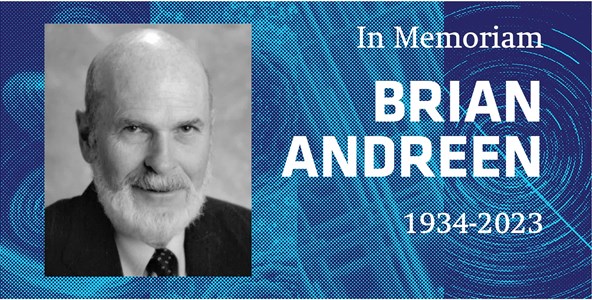
The Council on Undergraduate Research (CUR) joins the community in mourning the loss of Brian Andreen (1943-2023) – friend, mentor, husband, father, a founding chemist of CUR, previous executive secretary, At-Large Division Councilor (1985-90), and much more. Brian was committed to upholding the mission and value of CUR by continuing his efforts to expand CUR beyond only its founding chemists and embodying more diverse institutions, members, and divisions. In addition to the announcement made by Research Corporation for Science Advancement (RCSA), CUR shares with you continued admiration through quotes from members of our community who knew Brian personally:
Dr. Moses Lee, Senior Director of Scientific Research and Enrichment Programs for M.J. Murdock Charitable Trust states, “Brian was a visionary. Through his leadership and others, they changed the entire landscape and ethos of undergraduate research to what we know and love today. In his work, Brian has knowingly impacted the careers and lives of countless faculty and students, my own career included, plus many who are unbeknownst to Brian’s pivotal contributions in this area. His efforts have not only led to the formation of CUR, securing stable federal and private funding sources for research at predominantly undergraduate institutions (PUIs), creating the ACS national awards for research in chemistry and physics at PUIs, and most of all, he helped create a platform and made undergraduate research a household word. He will be dearly missed.”
From the University of Texas at San Antonio, Michael P. Doyle, CUR’s first President remembers Brian with his statement, “Brian Andreen’s concern with the low recognition of research at undergraduate chemistry departments led him in 1978 to compile and publish a directory, “Research in Chemistry at Private Undergraduate Colleges,” which described work in progress by the faculty of 93 chemistry departments along with background data on each department. To do this he sought advice from a small, representative team of college faculty, called this organization the Council on Undergraduate Research, and set each of the 10 “councilors” to work in advising and assisting him in the development of CUR’s first directory. From the enthusiasm expressed in that endeavor, and as a Regional Director of Research Corporation, he organized and sponsored a meeting, held in Pittsburgh on September 29 – 29, to establish if the Council on Undergraduate Research should continue and, if so, in what form. The rest is history – CUR was formed with Brian as Executive Secretary, and I was its President in those early years. Initially focused on chemistry in private liberal arts colleges, CUR was expanded after 1983 to include other science departments, public institutions, and, finally, all departments and institutions. Brian Andreen had a dream that became a reality in the Council on Undergraduate Research.”
Brian will be greatly missed, but his legacy will continue to live on within his surviving family – his wife, Jacqueline, and four children: Karin, Laurie, Carole, and Eric – as well as his community at RCSA and CUR.
Founded in 1978, the Council on Undergraduate Research (CUR) focuses on providing high-quality and collaborative undergraduate research, scholarly, and creative activity. Among the many activities and networking opportunities that CUR provides, the organization also offers support for the professional growth of faculty and administrators through expert-designed institutes, conferences, and a wide-range of volunteer positions. The CUR community, made up of nearly 700 institutions and 13,000 individuals, continues to provide a platform for discussion and other resources related to mentoring, connecting, and creating relationships centered around undergraduate research. CUR’s advocacy efforts are also a large portion of its work as they strive to strengthen support for undergraduate research. Its continued growth in connections with representatives, private foundations, government agencies, and campuses world-wide provides value to its members and gives voice to undergraduate research. CUR is committed to inclusivity and diversity in all of its activities and our community.
CUR focuses on giving a voice to undergraduate research with learning through doing. It provides connections to a multitude of campuses and government agencies, all while promoting networking and professional growth to its community.


